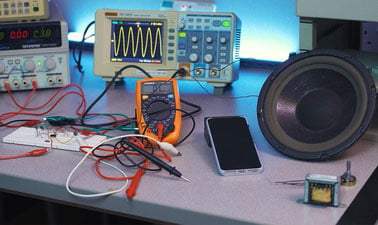
Alternating current (AC) is the type of electricity commonly used throughout the world to connect power plants, homes, and businesses. This course will give you an understanding of why AC is used and will allow you to design and analyse circuits which use AC electricity.
Read more
Alternating current (AC) is the type of electricity commonly used throughout the world to connect power plants, homes, and businesses. This course will give you an understanding of why AC is used and will allow you to design and analyse circuits which use AC electricity.
Alternating current (AC) is the type of electricity commonly used throughout the world to connect power plants, homes, and businesses. This course will give you an understanding of why AC is used and will allow you to design and analyse circuits which use AC electricity.
You will learn how to calculate voltages, currents and power in circuits with AC sources, how to calculate RMS voltage and current, how to handle both sinusoidal and non-sinusoidal sources, how to use relays and transistors as switches, how to design circuits with transformers, how to model realistic, non-ideal transformers, how to design and build simple DC power supplies and rectifiers, and we will explore concepts of maximum power transfer with AC circuits. In terms of sequencing, this course would be suitable for students who already have a working knowledge of basic DC circuits (such as our other MOOC Circuits for Beginners).
What you'll learn
At the end of this MOOC, learners will be able to discuss:
- how to calculate voltages, currents and power in circuits with AC sources
- how to calculate RMS voltage and current
- how to handle both sinusoidal and non-sinusoidal sources
- how to use relays and transistors as switches
- how to design circuits with transformers
- how to model realistic, non-ideal transformers
- how to design and build simple DC power supplies and rectifiers
- concepts of maximum power transfer with AC circuits
What's inside
Learning objectives
- How to calculate voltages, currents and power in circuits with ac sources
- How to calculate rms voltage and current
- How to handle both sinusoidal and non-sinusoidal sources
- How to use relays and transistors as switches
- How to design circuits with transformers
- How to model realistic, non-ideal transformers
- How to design and build simple dc power supplies and rectifiers
- Concepts of maximum power transfer with ac circuits
- How to calculate voltages, currents and power in circuits with ac sources
- How to calculate rms voltage and current
- How to handle both sinusoidal and non-sinusoidal sources
- How to use relays and transistors as switches
- How to design circuits with transformers
- How to model realistic, non-ideal transformers
- How to design and build simple dc power supplies and rectifiers
- Concepts of maximum power transfer with ac circuits
Syllabus
Good to know
Save this course
Activities
Review of Basic DC Circuits
Show steps
Lay a stronger foundational understanding to better grasp AC circuitry.
Browse courses on
DC Circuits
Show steps
-
Review your lecture notes.
-
Study textbooks or online resources.
-
Work through a few practice problems.
Animate Transformer Operation
Show steps
To maximize your retention and broaden your understanding, build a visual presentation.
Show steps
-
Create a diagram of a transformer in PowerPoint.
-
Use the animation tools to show how the transformer works.
-
Record an audio or video explanation.
Discuss AC Circuit Applications
Show steps
Engage with peers to enhance your learning.
Show steps
-
Form a discussion group.
-
Share your knowledge of AC circuit applications.
-
Work together to solve problems.
One other activity
Expand to see all activities and additional details
Show all four activities
Explore AC circuit examples
Show steps
Following tutorials will solidify your understanding of AC circuits from real-world applications.
Show steps
-
Find examples of AC circuits.
-
Review the circuit diagrams and explanations.
-
Try to build the circuits yourself.
Review of Basic DC Circuits
Show steps
Lay a stronger foundational understanding to better grasp AC circuitry.
Browse courses on
DC Circuits
Show steps
- Review your lecture notes.
- Study textbooks or online resources.
- Work through a few practice problems.
Animate Transformer Operation
Show steps
To maximize your retention and broaden your understanding, build a visual presentation.
Show steps
- Create a diagram of a transformer in PowerPoint.
- Use the animation tools to show how the transformer works.
- Record an audio or video explanation.
Discuss AC Circuit Applications
Show steps
Engage with peers to enhance your learning.
Show steps
- Form a discussion group.
- Share your knowledge of AC circuit applications.
- Work together to solve problems.
Explore AC circuit examples
Show steps
Following tutorials will solidify your understanding of AC circuits from real-world applications.
Show steps
- Find examples of AC circuits.
- Review the circuit diagrams and explanations.
- Try to build the circuits yourself.
Career center
Electrical Engineer
Electronics Engineer
Power Systems Engineer
Electrical Technician
Electronics Technician
Power Line Technician
Electrician
Instrumentation Technician
Controls Engineer
Power Electronics Engineer
Renewable Energy Engineer
Energy Efficiency Engineer
Electric Vehicle Engineer
Robotics Engineer
Mechatronics Engineer
Reading list
Share
Similar courses
OpenCourser helps millions of learners each year. People visit us to learn workspace skills, ace their exams, and nurture their curiosity.
Our extensive catalog contains over 50,000 courses and twice as many books. Browse by search, by topic, or even by career interests. We'll match you to the right resources quickly.
Find this site helpful? Tell a friend about us.
We're supported by our community of learners. When you purchase or subscribe to courses and programs or purchase books, we may earn a commission from our partners.
Your purchases help us maintain our catalog and keep our servers humming without ads.
Thank you for supporting OpenCourser.



